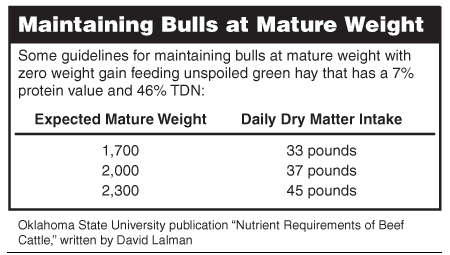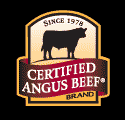
Kris Ringwall
Beef Talk
How much should bulls weigh?
Bull nutritional requirements are based on the projected value at mature weight. This means we have to answer the question about how much our bull will weigh at maturity.
The question seems simple, but the answer becomes subjective quickly for producers. To make a point, we understand that mature weight will vary. Perhaps the better question is: "What is one's ideal weight?"
Likewise, if one returns to discussing the bull, what is the ideal weight for a bull? A quick search of the Internet yielded the Oklahoma State University (OSU) publication "Nutrient Requirements of Beef Cattle," written by David Lalman.
 David's tables give the nutrient requirements for growing and mature bulls. The key to using the tables is to know what table to use based on three levels of mature bull size. The three levels are bulls at 1,700 pounds (lb.), 2,000 lb. and 2,300 lb.
David's tables give the nutrient requirements for growing and mature bulls. The key to using the tables is to know what table to use based on three levels of mature bull size. The three levels are bulls at 1,700 pounds (lb.), 2,000 lb. and 2,300 lb.
The daily maintenance, or zero-weight-gain, ration (hay or grass) varies by the size of the bull. A 1,700-lb. bull needs a daily intake of 33 lb. of dry matter that is 7% protein and 46% total digestible nutrients (TDN). The 2,000-lb. mature bull needs a daily intake of 37 lb. of dry matter that is 7% protein and 46% TDN. The 2,300-lb. mature bull needs a daily intake of 45 lb. of dry matter that is 7% protein and 46% TDN.
Essentially, the bulls need to consume just less than 2% of their body weight to hold even, while consuming nonspoiled hay that is at least green.
If the bull's body condition has slipped, improving the forage quality to 50% TDN and increasing the intake by 3 lb. for the lighter bulls and 2 lb. for the 2,300-lb. bulls should put on 0.5-lb. of gain per day. The key is adequate forage intake. By feeding better-quality hay, bulls should pick up in condition.
Good grass hay
goes a long way,
but keep in mind that nutrition is more than energy and protein.In reviewing the bulls that the Dickinson Research Extension Center overwintered, the 2½-year-old bulls weighed in at 1,659 lb. last fall, and the 1½-year-old bulls weighed in at 1,342 lb., a difference of 317 lb. Their condition scores were 6 or 7, which means they certainly were in good condition.
Although these weights seemed light, the numbers were not that different from the historical numbers for the center. In previous years, the 2½-year-old bulls averaged 1,895 lb. and ranged in condition score from 5 to 7. The younger set of historical 1½-year-old bulls averaged 1,376 lb. and had similar body condition scores.
Back to the original question: What would the bull's mature weight be? Historically, and I must admit to some fudging, the bulls at the center have gained approximately 300 lb. per year. If a bull weighed 1,300 lb. as a yearling, the bull would be expected to weigh 1,600 lb. as a 2-year-old, 1,900 lb. as a 3-year-old and 2,200 lb. as a 4-year-old.
Speculation would put the bull at 2,500 lb. as a 5-year-old. The center would not feed bulls with the expectation of having a 2,500-lb. bull at mature weight and the center does not keep the older bulls. Seldom has the center kept bulls or utilized them as 4-year-olds. Instead, the center would focus on younger bulls and those bulls that have a mature weight of 2,200 lb. or less.
The reason is temperament. The bulls do not necessarily have a bad temperament. However, as they get heavy, they tend to accidentally damage a lot more stuff. As bulls think posts were put in for their entertainment, they get harder to manage.
 Experience would say that bulls should be gaining muscle throughout the year, and that somewhere between ½ lb. and 1 lb. a day is a good gain that keeps the bulls in good shape, maybe even ideal shape, without excessive condition. Good grass hay goes a long way, but keep in mind that nutrition is more than energy and protein. Consult a good nutritionist for input on a complete supplement to ensure maximum fertility.
Experience would say that bulls should be gaining muscle throughout the year, and that somewhere between ½ lb. and 1 lb. a day is a good gain that keeps the bulls in good shape, maybe even ideal shape, without excessive condition. Good grass hay goes a long way, but keep in mind that nutrition is more than energy and protein. Consult a good nutritionist for input on a complete supplement to ensure maximum fertility.










